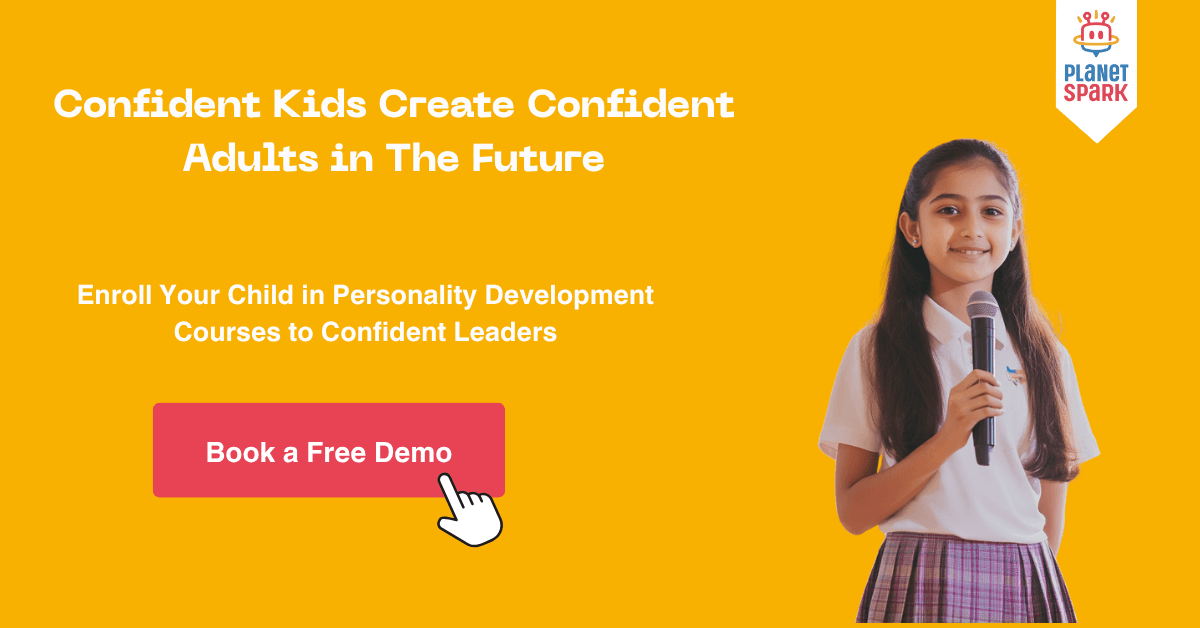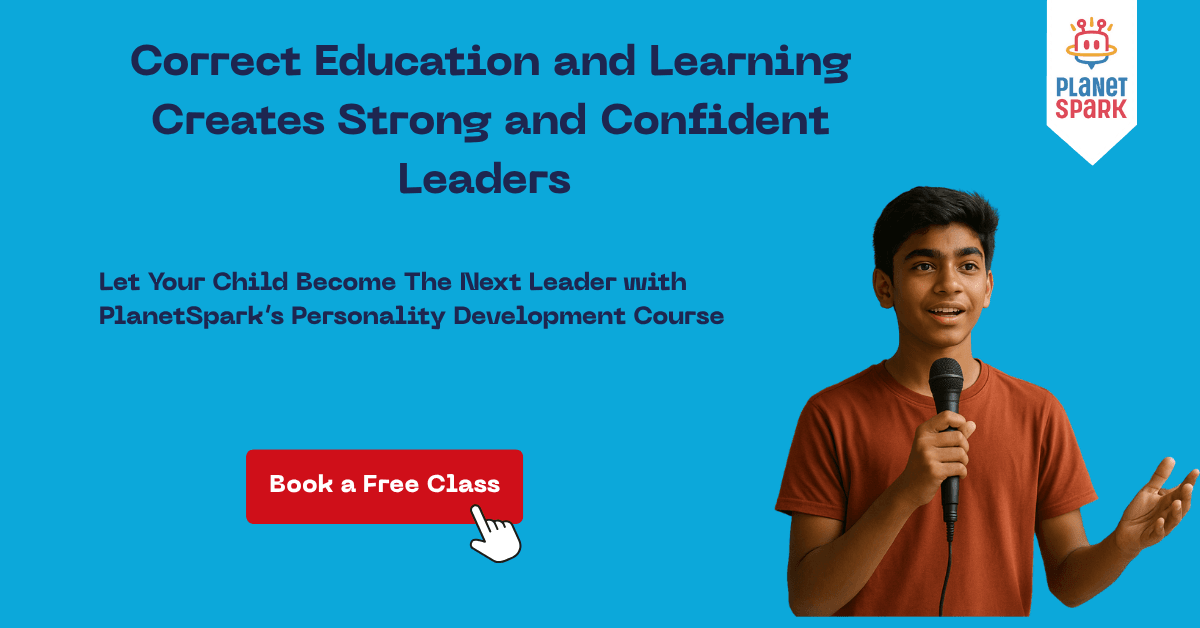Personality Development Activities for Kids | Guide

Table of Contents
- What is Personality Development?
- How Does Personality Development Help in the Future?
- Cultural and Age-Specific Influences
- Proven Programs and Success Stories
- Personality Development Activities for Kids
- Activities and Games to Build Key Traits
- About PlanetSpark’s Personality Development Programs for Kid
- Conclusion
- Frequently Asked Questions (FAQs)
Every parent dreams of watching their child grow into a confident, expressive, and emotionally intelligent individual. While academic success is important, it is a child’s personality that ultimately sets them apart. This is where personality development plays a crucial role.
Personality development is not about changing who your child is, but about unlocking their fullest potential. Through the right activities and environment, children can develop soft skills, confidence, emotional regulation, and communication abilities, all of which are essential for success in academics, careers, and personal relationships.
In this blog, we will explore what personality development for kids truly means, its long-term impact, and engaging activities that can help shape a well-rounded future for your child. The contribution of PlanetSpark's Personality Development Course will also be discussed in detail.
Foundations of Childhood Personality Development
Children’s personalities emerge from a mix of innate traits and early experiences. For example, temperament – a child’s inborn “style” of interacting with the world – varies widely (e.g., some infants are easy-going while others are more intense or cautious). These temperamental traits interact with parenting (“goodness of fit”) to shape behavior. Equally crucial is the attachment bond: consistent, sensitive caregiving in infancy builds “basic trust” (Erikson’s first stage) and a sense of security. Neuroscience shows why these early years matter: the young brain is extremely plastic, forming millions of neural connections per second in infancy. Early experiences – especially “serve-and-return” interactions with attentive adults – literally wire the brain, laying a foundation for all future learning and social skills. In parallel, children’s emotional intelligence (awareness and regulation of feelings) begins developing: research finds that preschoolers who better understand and manage emotions pay attention more easily, relate better to others, and even earn higher grades. In short, personality skills like self-control, empathy, and confidence grow hand-in-hand with brain development in early childhood.
Temperament & Attachment: A child’s innate temperament (easy-going vs. fussy vs. slow-to-warm) influences how they respond to situations. Positive attachments and consistent caregiving foster trust and self-esteem.
Brain Plasticity: Early childhood is a period of rapid brain growth: over a million new neural connections form every second in the first years of life. These connections build the architecture for emotion, thinking, and behavior. Early supportive experiences give children a “strong foundation,” while stress or neglect can weaken future learning pathways.
Emotional Learning: From infancy onward, children learn about feelings. Even babies begin to self-soothe and pick up on their caregivers’ moods. Teaching kids to recognize and label emotions (e.g., naming “happy,” “sad,” “angry”) pays off: Children with higher emotional intelligence are more attentive, engaged in school, and empathetic toward peers. In other words, helping kids handle feelings early boosts many positive outcomes.

What is Personality Development?
Personality development refers to the process of enhancing and grooming a child’s inner and outer self to bring about a positive change in their behavior, attitude, and communication style. It includes the development of emotional intelligence, social behavior, creative thinking, self-confidence, discipline, leadership, and public speaking skills.
This growth process happens gradually through experiences, education, and deliberate training. For kids, structured personality development programs can help accelerate this journey, especially during their formative years when their brains and social understanding are still evolving.
How Does Personality Development Help in the Future?
Investing in a child’s personality development lays the foundation for their holistic growth. Here's how it helps:
1. Builds Self-Confidence
Confident children are more likely to express their ideas, ask questions, and take initiative in classrooms and group settings. This self-assurance often translates into leadership roles in future workplaces.
2. Improves Communication Skills
Effective communication is vital in every aspect of life — from school presentations to job interviews and interpersonal relationships. Personality development helps kids organize their thoughts, speak clearly, and listen actively.
3. Boosts Emotional Intelligence
Children who are emotionally aware are better equipped to handle challenges, conflicts, and peer pressure. They learn empathy, self-regulation, and how to process emotions healthily.
4. Sharpens Social Skills
Social skills like cooperation, teamwork, and active listening enable kids to build meaningful relationships and excel in group tasks. These are crucial for workplace success and personal well-being.
5. Encourages Critical Thinking and Creativity
Activities focused on personality development often stimulate problem-solving and innovation. Kids learn to think out of the box, which helps them become adaptable in the face of change.
6. Prepares for Future Careers
As the job market shifts towards soft skills and adaptability, personality development gives children a strong advantage in competitive environments. Recruiters and employers increasingly value communication, leadership, and confidence over pure technical skills.
7. Fosters Independence and Responsibility
Through character-building exercises, children learn time management, accountability, and how to make decisions — traits that are essential for adult life.
Cultural and Age-Specific Influences
Personality unfolds within a cultural and developmental context. For example, cultural values shape which traits are encouraged. In collectivist cultures (e.g., many Asian or traditional societies), children are taught interdependence and to consider others’ needs; emphasis is on cooperation, respect for elders, and group harmony. By contrast, individualistic cultures (e.g., much of Europe or North America) stress personal independence and self-reliance; parents encourage exploration, initiative, and self-expression. These cultural patterns influence parenting styles (authoritative vs. authoritarian, for instance) and thus the personality skills children practice. In practice, a child in a collectivist family might learn empathy and teamwork as primary values, while a child in an individualistic setting might be guided more toward autonomy and confidence.
Likewise, age-appropriate goals evolve as children grow. Developmental psychologists (e.g. Erikson’s stages) describe how, at each age, children face new social and emotional tasks. For instance:
Infancy (0–2 years): Trust vs. Mistrust. Babies need consistent care and affection. When caregivers reliably meet needs (feeding, comforting), infants gain trust and hope. A secure start builds a child’s basic confidence in the world.
Toddler/Preschool (2–5 years): Autonomy and Initiative. As toddlers learn to walk and talk, they strive for independence (Erikson’s Autonomy vs. Shame) by trying new things on their own. By preschool age, kids engage in imaginative play and start taking initiative (Erikson’s Initiative vs. Guilt) – they dress themselves, ask questions, and lead games. Success at these stages means children feel capable and creative; excessive criticism can lead to self-doubt.
Elementary (6–12 years): Industry vs. Inferiority. School-age children refine skills and peer relationships. They compare themselves to classmates and seek accomplishments (sports, schoolwork, teamwork). Encouragement and praise lead to a sense of competence, while repeated failure or harsh judgments can make them feel inferior. This is the age to nurture resilience and cooperation through team projects, clubs, and classroom responsibilities.
Adolescence (13+ years): Identity vs. Role Confusion. Teens explore personal values, beliefs, and goals. They pull away from family to form their own identity. Positive support for their emerging independence (while still setting boundaries) helps teens develop purpose and self-confidence; too much pressure or discouragement can lead to confusion.
Educators and parents tailor activities to each stage: e.g., games that build trust and turn-taking for preschoolers, cooperative projects for elementary kids, and leadership opportunities (like student council or group planning) for teens. In each case, learning to work with others and understanding oneself are key developmental goals.

Proven Programs and Success Stories
A growing body of research shows that structured personality- and social-emotional programs can produce lasting benefits for children. For example, a 33-year follow-up of Chicago’s Cabrini-Green Youth Program (a community youth initiative) found striking long-term outcomes: alumni of the program were about twice as likely to complete college (24% vs. 12%) and twice as likely to have savings at the end of the month (35% vs. 19%) compared to similar peers who didn’t participate. This suggests early youth support programs can translate into higher education and financial stability decades later.
School-based social-emotional learning (SEL) curricula also show strong evidence. Meta-analyses of hundreds of SEL studies have found consistent, moderate-to-large positive effects across all grade levels. Students in SEL programs (often taught by trained teachers) show better social skills, more prosocial and cooperative behavior, and stronger relationships. They also exhibit fewer behavioral problems and emotional difficulties, and even improved academic performance due to greater engagement. Two meta-analyses noted these gains persist over time, benefiting children regardless of background. In sum, SEL programs, which teach skills like self-awareness, emotion regulation, empathy, decision-making, and relationship-building, produce measurable improvements in personality-related outcomes.
Specific programs illustrate these findings. The Roots of Empathy program (implemented in K–8 classrooms) brings a parent and baby into the class so students learn to recognize and discuss the infant’s feelings. In multiple evaluations, Roots of Empathy significantly reduced bullying and aggression and increased empathy and peer acceptance among participants. For instance, one randomized trial reported that children who participated showed lasting drops in aggression and gains in prosocial behavior, empathy, and social skills compared to control peers. Schools using this curriculum often note that children become kinder and more emotionally literate.
In another model, a UK study of character-education programs found that lessons explicitly focused on values like resilience, teamwork, and responsibility helped students develop confidence and social skills (e.g., debating, public speaking, peer mentoring). Although specifics vary, these examples show structured efforts – whether community projects or school SEL classes – can tangibly boost traits like confidence, cooperation, and resilience, often with outcomes measured years later.
Personality Development Activities for Kids
Let’s explore some highly effective and fun personality development activities you can try with your child:
1. Storytelling Sessions
Storytelling improves creativity, vocabulary, and expression. Encourage your child to narrate stories or participate in storytelling competitions.
2. Role Play and Drama
Pretend play helps children understand perspectives, build empathy, and improve verbal and non-verbal communication. It also boosts their confidence to perform in front of others.
3. Debate and Public Speaking
Engage your child in simple debates or extempore speaking on everyday topics. This strengthens logical thinking, persuasion, and speaking clarity.
4. Group Activities and Team Challenges
Organize team-building games like treasure hunts, puzzles, or problem-solving challenges to improve cooperation and leadership.
5. Creative Writing and Journaling
Encouraging kids to write about their day, emotions, or fictional ideas builds introspection, language fluency, and imagination.
6. Mindfulness and Meditation Exercises
Simple breathing techniques or guided meditations can improve focus, reduce anxiety, and enhance emotional regulation.
7. Learning New Skills
Hobbies like painting, playing a musical instrument, or learning a sport can contribute to self-expression, discipline, and self-esteem.
8. Practicing Gratitude
Ask children to write or share three things they are grateful for every day. This improves emotional balance and resilience.
9. Vision Boards and Goal Setting
Encourage your child to create a vision board or set monthly personal goals. This builds ambition, planning skills, and accountability.
10. Leadership Roles at Home
Assign small responsibilities like planning a family meal or organizing a game night. It boosts decision-making and leadership.
11. Positive Affirmations
Teach your child to repeat affirmations like “I am confident,” “I am capable,” or “I believe in myself.”
Activities and Games to Build Key Traits
Parents and teachers can reinforce these lessons with everyday activities that make learning fun. Research confirms that playful, game-based learning strongly enhances children’s social and emotional skills. For example, studies show that well-designed games and playful activities have moderate-to-large positive effects on children’s motivation, engagement, and social/emotional development. Role-playing games and cooperative tasks are especially powerful: by acting out different roles, children “step into the shoes” of others, practicing empathy and communication. Cooperative games (where children work toward a common goal) also teach negotiation and teamwork.
Some specific ideas include:
Role-Playing & Imaginative Play: Encourage kids to act out scenarios (e.g., playing doctor-patient, store clerk, or using puppets to tell stories). As one therapist-blog notes, “Engaging in role-play allows children to step into the shoes of others, which is crucial for developing empathy.” Discussing characters’ feelings or moral dilemmas after a role-play can deepen insight.
Emotion Games: Simple games like feeling charades (mime a feeling on your face/body, others guess) or an “emotion matching” card game help kids recognize and label emotions. Talking about characters in books (“How do you think she felt when…?”) also builds emotional literacy.
Cooperative Challenges: Puzzles, building tasks, or obstacle courses done in teams (where kids must take turns and help each other) reinforce patience and problem-solving. For example, one activity has children take turns adding pieces in a puzzle relay; another has kids navigate a simple obstacle course with changing rules (hop on one foot, balance a beanbag, etc.), teaching adaptability. Research shows such game-based tasks enhance teamwork and perseverance.
Communication Exercises: “Show and tell” sessions, reading stories together, or interviewing each other in pairs can boost confidence in speaking and listening. Games like “telephone” (whisper a message down a line) practice careful listening. Teachers can also hold circle-time discussions on everyday dilemmas or current events to give each child a voice. These activities practice clear expression and respectful listening.
Leadership and Responsibility Roles: Give children age-appropriate responsibilities in group activities. A toddler can be the snack helper; a school-age child might lead a class project or keep track of tasks. Roles like “line leader,” “classroom helper,” or rotating team captain in a game let kids practice leadership in a safe setting. Even informal “peer teaching” (older kids helping younger ones) builds confidence and communication. Children gain self-esteem by mastering tasks and by caring for peers.
Mindfulness and Growth Mindset: Simple breathing or visualization exercises help children manage stress and build resilience. When children tackle a challenging game or puzzle, praising effort and framing mistakes as learning opportunities (“You almost got it – what could we try differently?”) teaches a growth mindset. Over time, kids learn that persistence leads to success.
Each of these methods embeds an important trait-building. For instance, a cooperative scavenger hunt teaches teamwork and communication; a storytelling circle can foster empathy (as kids listen to diverse perspectives); and giving a child a chance to demonstrate a skill or share an accomplishment in front of peers builds self-confidence. As one meta-review notes, game-based learning “can be a promising tool” for promoting children’s social and emotional development. In practice, combining play with reflection (asking “How did that feel? What did we learn?”) helps children internalize the lessons.
In summary, children’s personalities are molded by a blend of biology and experience. Science tells us that early brain development, emotional learning, and secure relationships create the groundwork. Cultural values and age-stage challenges steer which traits to emphasize at each step. Critically, structured programs and everyday activities can actively shape traits like empathy, confidence, resilience, and leadership. By understanding these foundations and intentionally teaching social skills (through conversation, play, and practice), parents and educators can support healthy personality growth, setting kids up for positive long-term outcomes.
About PlanetSpark’s Personality Development Programs for Kids
PlanetSpark offers a structured and engaging Personality Development Course that blends creativity, communication, and confidence-building into a single powerful learning path. Tailored for children aged 4 to 16, these courses help develop public speaking, storytelling, creative writing, emotional intelligence, and leadership qualities.
Backed by certified communication trainers, scientifically designed modules, and engaging formats like debates, podcasts, and role plays, PlanetSpark ensures your child becomes future-ready, socially confident, and emotionally smart.
Ready to empower your child with lifelong skills? Sign up for a free trial class with PlanetSpark’s personality development experts today.
Conclusion
Investing in personality development is one of the most impactful gifts you can give your child. It not only enhances their present but also paves the way for a bright and confident future. With simple activities and the right guidance, children can blossom into articulate, resilient, and empathetic individuals.
Frequently Asked Questions (FAQs)
1. What is the best age to start personality development for kids?
The early years (ages 4-10) are ideal for starting personality development, as children’s minds are highly receptive and habits form easily during this phase.
2. Can personality be developed?
Yes, personality is not fixed. With the right guidance, exposure, and support, kids can develop social, emotional, and communication skills over time.
3. How long does it take to see improvement?
It varies from child to child, but consistent activities and structured programs often show noticeable changes within a few weeks.
4. Are personality development classes only for shy kids?
Not at all. Even confident children benefit by polishing their skills, gaining leadership qualities, and handling real-life challenges better.
5. What is unique about PlanetSpark’s program?
PlanetSpark combines live 1:1 classes, certified trainers, gamified learning, and practical tasks like speech delivery and debate to ensure complete transformation.
6. Is the course suitable for introverted kids?
Yes. The course helps shy or introverted kids come out of their shells gradually with gentle encouragement and activities tailored to their pace.
7. Do these activities help in academics, too?
Absolutely! Personality development improves focus, articulation, comprehension, and motivation, all of which have a positive impact on academics.
Personalized Communication Report
Record a video to get a AI generated personalized communication report for your child
